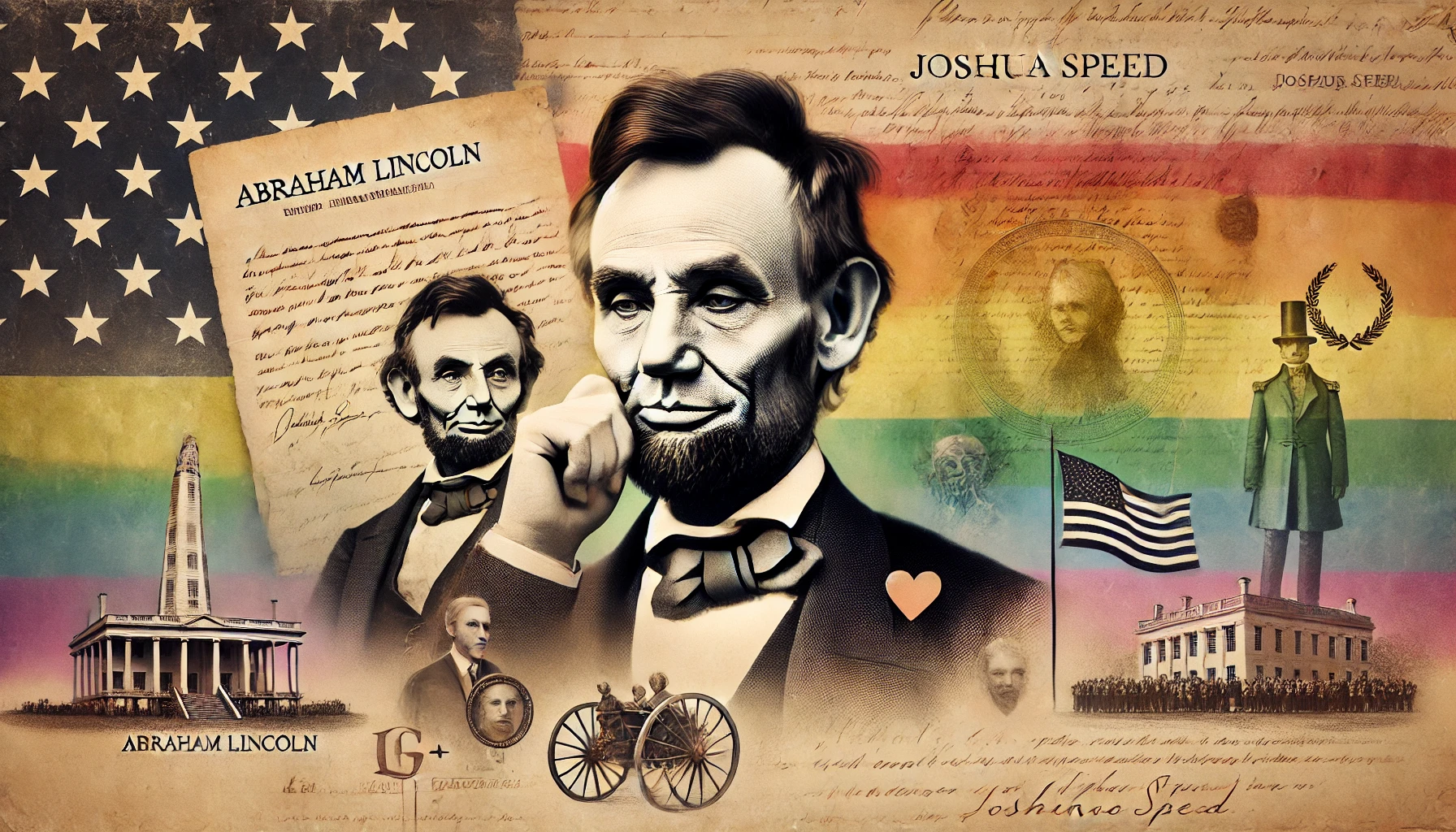Unpacking the Personal Life of Abraham Lincoln: Was He Gay?
Abraham Lincoln, one of the most iconic figures in American history, has long been celebrated for his leadership during the Civil War and his dedication to preserving the Union. However, recent debates have emerged over a different aspect of his life: Abraham Lincoln’s sexuality. In particular, scholars and documentaries, such as Lover of Men, have posed the question: Was Abraham Lincoln gay? This inquiry has stirred controversy, fascination, and reevaluation of Lincoln’s relationships, particularly with men such as Joshua Speed. By delving into historical letters, documents, and modern scholarship, we can explore this question and reassess how we view Lincoln’s private life.
Abraham Lincoln’s Sexuality: Exploring the Evidence
For years, the idea of Abraham Lincoln’s sexuality was largely left unexplored in mainstream historical scholarship. Lincoln’s close friendships with several men, most notably Joshua Speed, have been the subject of interpretation and speculation. While it is impossible to apply modern definitions of sexual orientation to figures from the 19th century, historical records provide insight into Abraham Lincoln’s romantic relationships, which some believe indicate a non-heteronormative aspect to his private life.
One of the primary figures discussed in these debates is Joshua Speed, a man with whom Lincoln shared a bed for four years while the two lived together in Springfield, Illinois. The emotional intensity of their correspondence has led some historians to question whether their relationship extended beyond friendship. In particular, the tone of Lincoln’s letters to Speed after they parted suggests deep affection. As Joshua Speed and Abraham Lincoln maintained their close bond, many scholars argue that the nature of their relationship might have been more than platonic(AOL.com).
Joshua Speed and Abraham Lincoln: A Close Friendship or Something More?
The relationship between Joshua Speed and Abraham Lincoln has intrigued historians for decades. During their time as roommates, the two men shared not only living quarters but also their deepest thoughts and concerns. While sharing a bed was not uncommon for men during the 19th century due to financial and space constraints, some scholars argue that Lincoln’s letters to Speed exhibit an emotional intensity that transcends typical male friendships of the era.
A key piece of evidence that fuels speculation about their relationship comes from Lincoln’s letters written to Speed after he married Fanny Henning. Lincoln’s anxiety about Speed’s marriage and the affectionate language he used in his letters have led some to believe that his feelings for Speed may have been more than those of a close friend. This period of Lincoln’s life is often cited as a turning point in understanding his emotional attachments and potential romantic relationships with men(Advocate.com).
Lover of Men: A Documentary that Explores Lincoln’s Sexuality
In recent years, the documentary Lover of Men has reignited debates about Lincoln’s sexuality by examining his relationships with men through a modern lens. Directed by Michael Peterson, the documentary draws upon letters, personal accounts, and expert analysis to explore Lincoln’s intimate connections with several male figures, including Joshua Speed, David Derickson, and Elmer Ellsworth. The film offers a fresh perspective on Abraham Lincoln’s romantic relationships, suggesting that his close ties to these men could have had a significant impact on his personal life(Advocate.com).
What makes Lover of Men particularly compelling is its portrayal of Lincoln’s relationships not just as friendships but as potentially romantic. By examining Lincoln’s private life in the context of 19th-century views on sexuality, the documentary challenges viewers to rethink traditional historical narratives. The film’s exploration of human sexuality and gender roles in Lincoln’s time also highlights the fluidity of sexual identity, suggesting that modern labels such as “gay” or “straight” may not fully capture the complexity of Lincoln’s relationships(OUT FRONT).
Abraham Lincoln in LGBTQ History: Reassessing a Legacy
Beyond his role as a statesman, the idea of Abraham Lincoln in LGBTQ history has become a significant topic in queer historical scholarship. Whether or not Lincoln can be definitively classified as gay, the very act of exploring his personal life in this light opens new doors for understanding historical LGBTQ figures. By applying modern sensibilities to figures from the past, scholars can broaden our view of human sexuality and challenge rigid definitions that may not have existed during Lincoln’s time(PinkNews).
The discussion about Lincoln’s sexuality has sparked both interest and backlash, particularly from historians who view Lincoln as a symbol of American greatness. The argument that Lincoln could have been romantically involved with men challenges the conventional image of the president and forces a reconsideration of queer history. Yet, this conversation is important not only for understanding Lincoln himself but also for acknowledging that LGBTQ+ figures have always existed in history, even if their stories have been obscured(OUT FRONT).
Queer History and Historical LGBTQ Figures: Changing Perceptions
The exploration of Lincoln’s personal life offers a broader opportunity to discuss queer history and how we view historical LGBTQ figures. Figures like Lincoln, who were previously considered heterosexual by default, are now being reexamined through a modern lens that acknowledges the complexity of human relationships and sexual fluidity. By looking at historical figures in this way, we begin to understand that LGBTQ history is not limited to the modern era but stretches back through centuries of human interaction.
The examination of Lincoln’s sexuality through projects like Lover of Men helps to normalize the idea that same-sex relationships, whether romantic or platonic, were part of the fabric of history. It also serves to remind us that our understanding of sexuality and identity has evolved over time. Lincoln’s relationships, especially with Joshua Speed, may reflect deeper emotional bonds that challenge the traditional narratives of his life(PinkNews).
Sexuality in American History: A Broader View
The debate over Abraham Lincoln’s sexuality is part of a larger conversation about sexuality in American history. As we examine the lives of historical figures through the lens of modern identity politics, we must be cautious about projecting contemporary ideas onto the past. However, this does not mean that we should shy away from asking important questions. By looking at figures like Lincoln, we can gain a better understanding of how societal norms around relationships and sexuality have changed—and how they have stayed the same.
In this light, the study of Lincoln’s relationships with men offers an opportunity to explore broader themes of intimacy, friendship, and affection in American history. Whether Lincoln was gay, bisexual, or simply enjoyed deep friendships with other men, his relationships provide valuable insights into the way people of his era expressed emotional closeness(Advocate.com).
Reassessing Abraham Lincoln’s Legacy
The question of was Abraham Lincoln gay remains unanswered definitively, but the exploration of his personal relationships has sparked important discussions about Abraham Lincoln’s sexuality, LGBTQ history, and the fluidity of human identity. Whether we view Lincoln through the lens of modern labels or as a product of his time, his relationships with men like Joshua Speed offer new insights into a figure we thought we knew so well.
As the conversation continues, works like Lover of Men challenge us to reconsider what we know about historical figures and to acknowledge the complexity of their personal lives. By asking these questions, we are not only reassessing Lincoln’s legacy but also broadening our understanding of queer history and the role that historical LGBTQ figures have played in shaping the world we live in today.
For those interested in exploring more about how history is being reexamined through modern perspectives, Regent Studies offers a wealth of resources that delve into the intersection of history, identity, and culture.
To learn more about the context of Lincoln’s relationships, check out this article on queer historical figures for additional perspective




